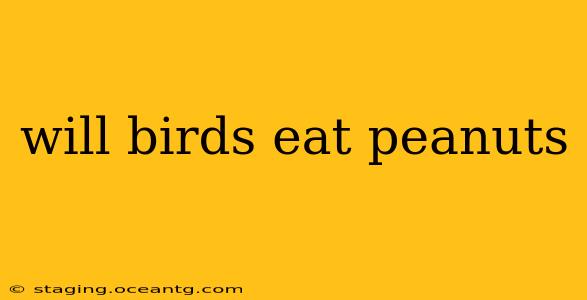Will Birds Eat Peanuts? A Comprehensive Guide for Bird Lovers
Many backyard bird enthusiasts wonder if peanuts are a suitable treat for their feathered friends. The short answer is: yes, many birds will eat peanuts, but there are important considerations to ensure you're providing a safe and nutritious snack. This guide delves into the specifics, addressing common questions and concerns.
What Kinds of Birds Eat Peanuts?
A wide variety of birds enjoy peanuts, including:
- Blue Jays: These intelligent birds are particularly fond of peanuts and are often seen actively seeking them out.
- Chickadees: These small, active birds readily consume peanuts, often caching them for later consumption.
- Titmice: Similar to chickadees, titmice are enthusiastic peanut eaters.
- Nuthatches: These acrobatic birds will cling to branches and readily eat peanuts.
- Woodpeckers: Certain woodpecker species will enjoy peanuts, especially if they are offered in a suet feeder.
- Doves: These ground-feeding birds will happily pick up peanuts scattered on the ground.
It's important to note that not all bird species will eat peanuts, and some might find them less appealing than other foods. The best way to determine which birds in your area will eat peanuts is to observe their feeding habits and experiment with different types of bird feeders and food offerings.
Are Peanuts Safe for Birds?
While peanuts are a good source of protein and fat, which birds need for energy, there are some safety concerns to consider:
- Aflatoxins: These are toxins produced by certain molds that can grow on peanuts. Aflatoxins can be harmful to birds, so it's crucial to use only high-quality, fresh peanuts that are free from mold or signs of spoilage. Avoid peanuts that are rancid or have a musty smell.
- Salt: Salted peanuts should absolutely be avoided. Salt is toxic to birds in large quantities and can lead to dehydration and other health problems. Always choose unsalted peanuts.
- Size: Whole peanuts can be choking hazards for smaller birds. Consider offering shelled peanuts, peanut pieces, or peanut butter (unsalted and xylitol-free) instead.
How Should I Offer Peanuts to Birds?
There are several ways to offer peanuts to birds:
- Whole Peanuts in a Feeder: Use a feeder designed for larger seeds or nuts, ensuring it's sturdy enough to withstand the weight.
- Shelled Peanuts in a Feeder: This eliminates the need for birds to crack the shells and reduces waste.
- Peanut Pieces: Breaking peanuts into smaller pieces makes them safer and more accessible for smaller birds.
- Peanut Butter: Spread unsalted, xylitol-free peanut butter on a tree branch or inside a suet feeder.
What Other Foods Can I Offer Birds Besides Peanuts?
Peanuts should be part of a varied diet. Other suitable foods include:
- Sunflower seeds: A popular and nutritious choice for many bird species.
- Nyjer seeds: Attracts smaller birds such as finches.
- Suet: A high-energy food source, especially beneficial in colder months.
- Mealworms: A great source of protein, particularly for insectivorous birds.
- Fruits and berries: Offer a variety of natural fruits and berries seasonally.
Remember to always provide fresh, clean water alongside food.
Can I Give Birds Roasted Peanuts?
It's best to avoid roasted peanuts as the roasting process can reduce their nutritional value and potentially add harmful additives. Opt for raw or unsalted peanuts instead.
Are Peanuts Better Than Other Birdseed?
Peanuts offer a good source of protein and fat, but they shouldn't replace other types of birdseed entirely. A balanced diet is essential for the health and well-being of birds. Offering a mix of seeds, nuts, fruits, and insects provides the best nutrition.
By following these guidelines, you can safely and responsibly provide peanuts as a nutritious and enjoyable treat for your local bird population. Remember, responsible bird feeding practices benefit both the birds and the environment.
